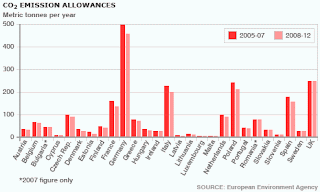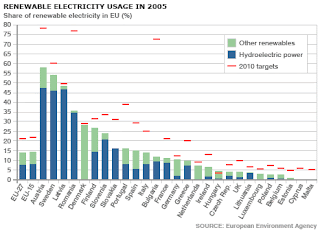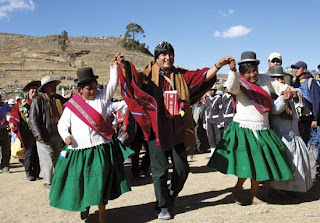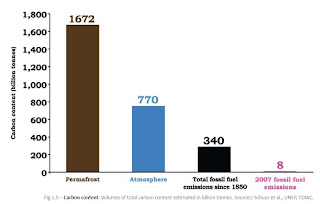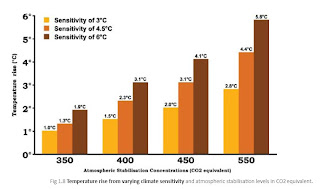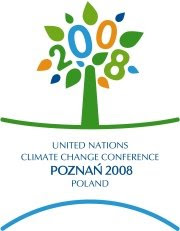
Here is an analysis from the Poznan climate change conference (that has just wound up) from the latest Earth Negotiations Bulletin released by the International Institute for Sustainable Development (IISD). Seems it was a bit disappointing overall, but this is not surprising given that Obama wasn't there and most countries will wait and see what the US does before they act. I have highlighted the good bits for easy reading. .
POZNAŃ AND THE (LONG) ROAD TO COPENHAGEN
.
A year after the historic Bali Climate Change Conference, negotiators are now at the halfway point on the Bali Roadmap, which launched a two-year process to strengthen international climate change cooperation. Looking back, progress has been achieved in 2008 through four sessions and discussions on the key elements of the future regime. However, pressure is mounting for the remaining 12 months: serious negotiations must begin as soon as possible in 2009 to secure an agreement in Copenhagen next December.
.
(POLITICAL) CLIMATE AT THE END OF 2008
.
The political context for the Poznań Conference was somewhat different from the Bali negotiations in 2007. In Bali, the atmosphere was characterized by the strong international reaction to the Fourth Assessment Report (AR4) of the Intergovernmental Panel on Climate Change (IPCC) and a sense of urgency about climate change. In Poznań, by contrast, the negotiations took place against the backdrop of a rapidly worsening global financial situation. Many were concerned about climate policy falling victim to the crisis – and even the most optimistic were expecting the financial crisis to have some impact on the process.
.
The European Union and others at the Conference tried to stress their ongoing commitment to combating climate change, arguing that a transition to a low carbon society entails not only costs but also important economic opportunities. However, at the same time as the Poznań Conference, protracted negotiations were taking place on the EU’s climate and energy policy package to implement a 20% emission reduction target by 2020, causing some to question whether the EU’s leadership on climate policy is faltering. On the last day of the Poznań Conference, delegates were pleased to hear news that agreement had been reached in Brussels on the EU package, even though some NGOs criticized the concessions made to secure the compromise. The package, covering the period from 2013 to 2020, lays down rules for the third phase of the EU Emissions Trading Scheme (ETS), details individual emission targets for EU Member States in sectors not covered by the ETS, and contains a 20% target for renewable energy, a 10% target for biofuels and a 20% target for increasing energy efficiency by 2020.
.
At the same time, Barack Obama’s victory in the US Presidential elections was a reason for optimism in Poznań. Obama has promised to make climate change a high priority and highlighted a green energy economy as a remedy for the ongoing economic crisis. In Poznań, the US was still represented by the Bush administration and remained relatively subdued during the official negotiations. Some felt that uncertainty about the US position in 2009 caused other countries to refrain from making significant political advances in Poznań, and few expect developing countries to make significant moves before developed countries have clarified their positions on emission reductions and financing. Overall, most felt that the political circumstances surrounding the Poznań Conference were not ideal for major political breakthroughs, which could justify its modest results. “One of those less exciting in-between COPs,” was how some veterans characterized the meeting.
.
(VARIED) EXPECTATIONS AND OUTCOMES
.
The agenda in Poznań was exceptionally full, with six bodies considering more than 90 agenda items and sub-items. This put a strain on many delegations and highlighted the importance of prioritizing work. This meant that some of the less urgent agenda items were not given as much attention as usual, leading to a focus on issues related to the Bali Roadmap: the Ad Hoc Working Group on Long-term Cooperative Action (AWG-LCA), Ad Hoc Working Group on Further Commitments by Annex I Countries under the Protocol (AWG-KP) and the second review of the Kyoto Protocol under Article 9. Delegates also focused on a few other agenda items included the operationalization of the Adaptation Fund and the Clean Development Mechanism (CDM).
.
AWG-LCA: At its fourth meeting, the AWG-LCA spent a lot of time considering “a shared vision for long-term cooperative action,” which was the subject of an in-session workshop, contact group and a ministerial round table. According to the Bali Action Plan, “a shared vision” includes a global goal for emission reductions. While some optimists had hoped for an agreement in Poznań on a long-term global emission goal to guide the negotiations in 2009, there were no serious attempts to achieve such an outcome. Instead, many veterans are predicting that this question will not be resolved until Copenhagen, since it seems likely to be a key part of whatever package deal is reached. They took it as a positive sign, however, that a common understanding seemed to be emerging in Poznań that “a shared vision” covers all the key building blocks of the Action Plan, namely mitigation, adaptation, technology and finance. Many also felt that progress was made on the concept of monitoring, reporting and verifying (MRV) and the idea of a registry for nationally appropriate mitigation actions in developing countries.
.
In contrast, suggestions for differentiation among developing countries were firmly rejected by some groups within the G-77/China – while being endorsed by many industrialized countries. Some proposals on adaptation were also made more concrete, including the insurance mechanism proposed by AOSIS. These and many other ideas were incorporated in the “assembly document,” a collection of submissions and proposals, which was one of the key outcomes of AWG-LCA 4 and is expected to evolve into a formal negotiating text during the first half of 2009.
.

.
AWG-KP: For the AWG-KP, the focus was on a strategic discussion of all the key items on its agenda and on the work programme for 2009, with a view to agreeing on further actions required to finalize Annex I countries’ post-2012 commitments in Copenhagen. Some observers and developing countries were hoping for a clear decision on the aggregate range of mid-term emission reductions by industrialized countries. However, while the 25-40% range by 2020 from the AR4 once again appears in the AWG-KP’s conclusions, the language is similar to that used in previous conclusions and falls short of a definitive commitment..
According to some negotiators, this was mostly due to the reluctance of some Umbrella Group countries to commit to a mid-term range at this point. However, many also noted the lack of serious attempts to reach an agreement on this issue in Poznań, possibly because delegates realized the political climate was not yet ripe for such discussions. Overall, most felt that the outcomes from the AWG-KP were modest, limited to the 2009 work programme and to agreement that Annex I countries’ further commitments should “principally” take the form of quantified emission limitation and reduction objectives (QELROs). Those with lower expectations for the meeting noted that little more than this might have been expected, as parties wait for the bottom of the market downturn and the arrival of the new US administration.
.
ADAPTATION FUND: Along with the Poznań work programme on technology transfer, the only concrete outcome of the Poznań conference was the operationalization of the Adaptation Fund. The COP/MOP adopted several decisions to make the Fund operational, including on arrangements with the Global Environment Facility and World Bank. Importantly, all three tracks to access funds – through implementing entities, accredited national entities, and direct access by parties – have been enabled. The Fund is, therefore, expected to start financing adaptation projects and programmes in developing countries in the next year.
.
The success on the Adaptation Fund was tempered by the inability to secure additional resources for the Fund due to lack of agreement on extending the share of proceeds (or “adaptation levy”) to Joint Implementation and emissions trading under the second review of the Protocol under Article 9. As many had predicted, these consultations were difficult and were unable to produce an agreement, leading COP/MOP 4 to conclude the second review of the Protocol without any substantive outcome. Most developing countries expressed deep disappointment at the failure to increase adaptation funding.
.
While many parties and private sector representatives had also hoped for improvements to the CDM under the Article 9 review, the lack of outcome on the review meant that the improvements negotiated in Poznań were not adopted. The AWG-KP, however, agreed to further consider issues related to the mechanisms in the post-2012 period in its March/April session.
.
FROM POZNAŃ TO COPENHAGEN: KEY TASKS FOR THE YEAR AHEAD
.
Leaving Poznań, there was little doubt in participants’ minds that plenty of critical work remains for 2009 under the Bali Roadmap. For both the AWG-KP and AWG-LCA, one of the first key tasks is generating formal negotiating texts that must be communicated to the parties at least six months before Copenhagen to comply with legal formalities. The Poznań Conference was widely seen as a successful step in that direction as the Chairs of both AWGs were mandated to prepare documents for the March/April meeting in Bonn.
.
The task of the AWG-LCA for 2009 will not be easy. The group will have to finalize an agreement on all four building blocks and a shared vision. It is the only body where all countries, including the US and developing countries, participate in discussions on mitigation. Thus, negotiations on a global long-term goal, comparability of mitigation efforts by developed countries and MRV in the context of nationally appropriate developing country mitigation actions are expected to be central. Importantly, MRV also applies to developed country support to developing countries through technology, finance and capacity-building, so ways of doing this will have to be identified. With regard to financing and technology, the AWG-LCA faces the challenge of reaching agreement on the architecture to both finance mitigation and adaptation actions, and facilitate technology development and transfer. Evaluation of proposals contained in the assembly document will be part of this task.
.
The AWG-KP has a clear objective for 2009: to agree on further commitments for Annex I countries in the post-2012 period. Some developing countries were therefore somewhat disappointed at the lack of clear sequencing of tasks in the AWG-KP’s 2009 work programme. Many developed countries were, however, pleased with text reaffirming the programme’s iterative nature and agreement to “maintain a coherent approach” between the Convention and the Protocol in relation to Annex I parties’ commitments.
.
Based on some signals in Poznań, some are predicting that the relationship between the Convention and Protocol tracks could become increasingly relevant in 2009. Many developed countries maintain that the work of the two AWGs should be coordinated given that both, for instance, address mitigation by developed countries. In Poznań, Norway, the EU and others also alluded to a “package” and “comprehensive agreement” in Copenhagen, and New Zealand proposed forming a Committee of the Whole and proceeding on the basis of a single negotiating text in June 2009. However, many developing countries and the US have sternly opposed attempts to link the Convention and Protocol tracks, with many developing countries concerned that this could take focus away from new emission reduction targets for industrialized countries under the Protocol, and the US seeking to avoid any proposals that would draw it into discussions related to the Protocol. It therefore remains to be decided in 2009 how to avoid duplication of work under the different tracks of the Bali Roadmap and what the legal outcome of the negotiations will ultimately be. Important as the legal and procedural questions are for the negotiators gathering in Copenhagen, most predict that it will be political will that determines the outcome.
.
ALL ROAD(MAPS) LEAD TO COPENHAGEN
.
While many agreed that the Poznań meeting resulted in some progress and positive steps forward, the general feeling was that negotiators had not achieved any major breakthroughs. Those who had hoped for decisive action blamed a lack of political leadership and determination they think would have signaled impending success in the coming year. Instead, many predict that agreement on the most critical issues, including mid- and long-term emission goals and finance, will not be reached before Copenhagen. This has led some to reconsider their expectations of what would constitute success in Copenhagen, and how many details of the new climate regime will need to be finalized after 2009.
.
Understandably, some participants left Poznań somewhat worried, feeling that while scientific evidence on climate change is strengthening, the “spirit of Bali” is weakening along with countries’ determination to fight climate change in light of the serious economic crisis.
.
Others, though, were not willing to abandon their optimism just yet. They referred to statements from both the EU and the US on measures to tackle the economic crisis that would also contribute to climate change mitigation and transition to a low carbon economy.
.
Some veterans who are more used to the ups-and-downs of international negotiating processes also suggested that Poznań’s modest outcome could be a positive thing in the larger scheme of things. In the words of one observer, “delegates needed to be reminded that success is not inevitable, and that without strong political will it is quite possible that they will fail to make the historic breakthrough needed in Copenhagen.”
.
Other topics include:
.
Australia,
Biodiversity,
Business,
Carbon Reduction Pollution Scheme,
China,
Climate Change,
Coal,
Conferences,
Earth,
Emissions,
Green Wash,
Health,
IPCC,
Murray-Darling River,
Nanotechnology,
Nuclear,
Peak Oil,
Politics,
Poverty,
Protests,
Psychology,
Public Participation,
Religion,
Science,
Social,
Sustainability 2.0,
Technology,
United Kingdom,
United Nations and the
United States.

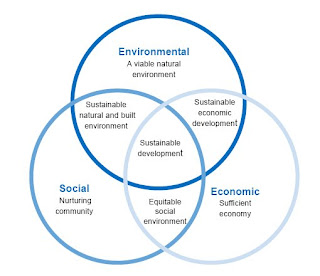
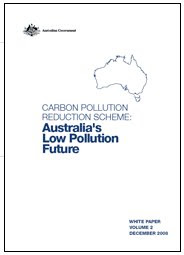



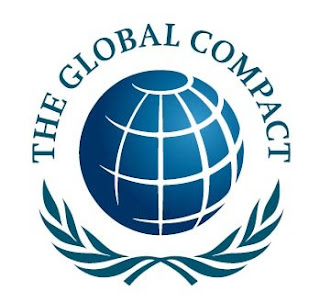


 .
.


